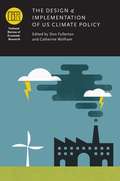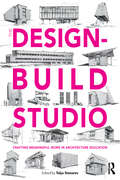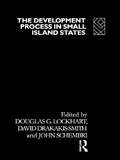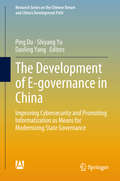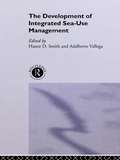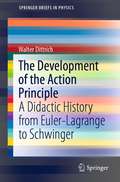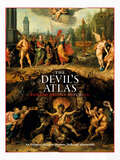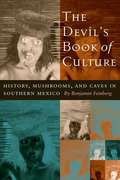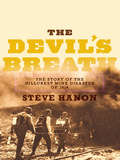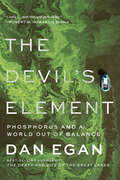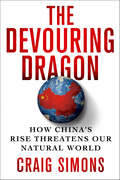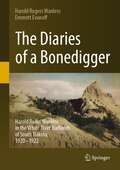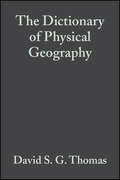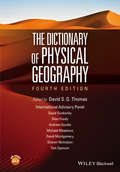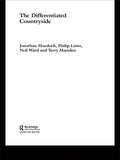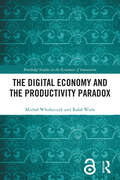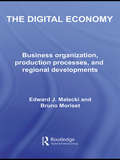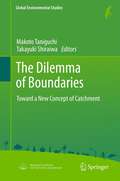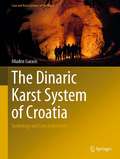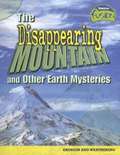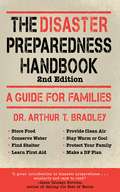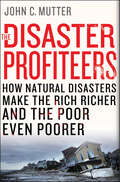- Table View
- List View
The Design and Implementation of US Climate Policy
by Don Fullerton Catherine WolframEconomic research on climate change has been crucial in advancing our understanding of the consequences associated with global warming as well as the costs and benefits of the various policies that might reduce emissions of greenhouse gases. As nations work to develop climate policies, economic insights into their design and implementation are ever more important. With a balance between theoretical and empirical approaches, The Design and Implementation of US Climate Policy looks at the possible effects of various climate policies on a range of economic outcomes. The studies that comprise the volume examine topics that include the coordination--or lack thereof--between the federal and state governments, implications of monitoring and enforcing climate policy, and the specific consequences of various climate policies for the agricultural, automotive, and buildings sectors.
The Design-Build Studio: Crafting Meaningful Work in Architecture Education
by Tolya StonorovThe Design-Build Studio examines sixteen international community driven design-build case studies through process and product, with preceding chapters on community involvement, digital and handcraft methodologies and a graphic Time Map. Together these projects serve as a field guide to the current trends in academic design-build studios, a window into the different processes and methodologies being taught and realized today. Design-build supports the idea that building, making and designing are intrinsic to each other: knowledge of one strengthens and informs the expression of the other. Hands-on learning through the act of building what you design translates theories and ideas into real world experience. The work chronicled in this book reveals how this type of applied knowledge grounds us in the physicality of the world in which we live.
The Destruction of Palestine Is the Destruction of the Earth
by Andreas MalmMalm unearths the shared roots of colonial adventurism in Palestine and fossil fuelled warfare.Israel&’s pulverization of Gaza since October 7, 2023 is not only a humanitarian crisis, but an environmental catastrophe. Far from the first event of its kind, the devastation Israel has inflicted on Palestine since October 2023 has merely ushered in a new phase in a long history of colonization and extraction that reaches back to the nineteenth century. In this urgent pamphlet, Andreas Malm argues that a true understanding of the present crisis requires a longue durée analysis of Palestine's subjugation to fossil empire. Returning to the British empire&’s first use of steam-power in war, in which it destroyed the Palestinian city of Akka, Malm traces the development of Britain&’s fossil empire and shows how this enduring commitment to fossil energy continues to drive Western support for the destruction of Palestine today.
The Destruction of the Bison: An Environmental History, 1750-1920
by Andrew C. IsenbergThe Destruction of the Bison explains the decline of the North American bison population from an estimated 30 million in 1800 to fewer than 1000 a century later. In this wide-ranging, interdisciplinary study, Andrew C. Isenberg argues that the cultural and ecological encounter between Native Americans and Euroamericans in the Great Plains was the central cause of the near extinction of the bison. Drought and the incursion of domestic livestock and exotic species such as horses into the Great Plains all threatened the Western ecosystem, which was further destabilized as interactions between Native Americans and Euroamericans created new types of hunters in both cultures: mounted Indian nomads and white commercial hide hunters. In the early twentieth century, nostalgia about the very cultural strife that first threatened the bison became, ironically, an important impetus to its preservation.
The Development Process in Small Island States
by David Drakakis-Smith Douglas G. Lockhart John SchembriFirst Published in 2004. Routledge is an imprint of Taylor & Francis, an informa company.
The Development of E-governance in China: Improving Cybersecurity and Promoting Informatization as Means for Modernizing State Governance (Research Series on the Chinese Dream and China’s Development Path)
by Ping Du Shiyang Yu Daoling YangThis book figures out that network security and informatization have entered a development stage of greater permeation and deeper integration into all aspects of the economy and society. In particular since the 2008 financial crisis, the world’s major economies have placed a strategic focus on network security and informatization in order to seek out new growth points, alleviate energy and ecological pressures, improve living standards, and improve social governance through new technological transformations in fields such as cloud computing, the Internet of Things, mobile internet, big data, smart cities, and a wave of applications. The effects on the economy and society have emerged and will continue to make significant progress. Based on China’s stage of new urbanization, industrialization, informatization, and agricultural modernization and major characteristics, as well as the intrinsic need for synchronized development, this book encourages society to accelerate the pace of development, expand the scope of work and promote informatization and the comprehensive, coordinated, effective linking and deep integration of informatization with all areas of the economy and society.
The Development of Integrated Sea Use Management (Routledge Advances in Maritime Research)
by Hance D. Smith Adalberto VallegaFirst published in 1991. Routledge is an imprint of Taylor & Francis, an informa company.
The Development of the Action Principle: A Didactic History from Euler-Lagrange to Schwinger (SpringerBriefs in Physics)
by Walter DittrichThis book describes the historical development of the principle of stationary action from the 17th to the 20th centuries. Reference is made to the most important contributors to this topic, in particular Bernoullis, Leibniz, Euler, Lagrange and Laplace. The leading theme is how the action principle is applied to problems in classical physics such as hydrodynamics, electrodynamics and gravity, extending also to the modern formulation of quantum mechanics and quantum field theory, especially quantum electrodynamics. A critical analysis of operator versus c-number field theory is given. The book contains many worked examples. In particular, the term "vacuum" is scrutinized.The book is aimed primarily at actively working researchers, graduate students and historians interested in the philosophical interpretation and evolution of physics; in particular, in understanding the action principle and its application to a wide range of natural phenomena.
The Devil's Atlas: An Explorer's Guide to Heavens, Hells and Afterworlds
by Edward Brooke-HitchingPacked with strange stories and spectacular illustrations, The Devil's Atlas leads you on an adventure through the afterlife, exploring the supernatural worlds of global cultures to form a fascinating traveler's guide quite unlike any other. From the author of the critically acclaimed bestsellers The Phantom Atlas, The Sky Atlas, and The Madman's Library comes a unique and beautifully illustrated guide to the heavens, hells, and lands of the dead as imagined throughout history by cultures and religions around the world. Packed with colorful maps, paintings, and captivating stories, The Devil's Atlas is a compelling tour of the geography, history, and supernatural populations of the afterworlds of cultures around the globe. Whether it's the thirteen heavens of the Aztecs, the Chinese Taoist netherworld of "hungry ghosts," Islamic depictions of Paradise, or the mysteries of the Viking mirror world, each is conjured through astonishing images and a highly readable trove of surprising facts and narratives, stories of places you'd hope to go, and those you definitely would not. A traveler's guide to worlds unseen, here is a fascinating visual chronicle of our hopes, fears, and fantasies of what lies beyond. DISCOVER THE BEYOND: From the depths of underworlds to the heights of heavens and everywhere else a life after death may be spent, this atlas explores the geography, history, and supernatural populations of the afterworlds of global mythologies. A GLOBAL SURVEY: From the demon parliament of the ancient Maya, to the eternal globe-spanning quest to find the Earthly Paradise, to the "Hell of the Flaming Rooster" of Japanese Buddhist mythology (in which sinners are tormented by an enormous fire-breathing cockerel), The Devil's Atlas gathers together a wonderful variety of beliefs and representations of life after death. UNUSUAL AND UNSEEN: These afterworlds are illustrated with an unprecedented collection of images. They range from the marvelous "infernal cartography" of the European Renaissance artists attempting to map the structured Hell described by Dante and the decorative Islamic depictions of Paradise to the various efforts to map the Garden of Eden and the spiritual vision paintings of nineteenth-century mediums. EXPERT AUTHOR: Edward Brooke-Hitching is a master of taking visually–driven deep dives into unusual historical subjects, such as the maps of imaginary geography in The Phantom Atlas, ancient pathways through the stars in The Sky Atlas, and the literary oddities lining the metaphorical shelves of The Madman's Library. Perfect for:Obscure history and mythology enthusiastsAnyone with an interest in the occultSpiritual curiosity seekersMap lovers
The Devil's Book of Culture: History, Mushrooms, and Caves in Southern Mexico
by Benjamin FeinbergSince the 1950s, the Sierra Mazateca of Oaxaca, Mexico, has drawn a strange assortment of visitors and pilgrims—schoolteachers and government workers, North American and European spelunkers exploring the region's vast cave system, and counterculturalists from hippies (John Lennon and other celebrities supposedly among them) to New Age seekers, all chasing a firsthand experience of transcendence and otherness through the ingestion of psychedelic mushrooms "in context" with a Mazatec shaman. Over time, this steady incursion of the outside world has significantly influenced the Mazatec sense of identity, giving rise to an ongoing discourse about what it means to be "us" and "them." In this highly original ethnography, Benjamin Feinberg investigates how different understandings of Mazatec identity and culture emerge through talk that circulates within and among various groups, including Mazatec-speaking businessmen, curers, peasants, intellectuals, anthropologists, bureaucrats, cavers, and mushroom-seeking tourists. Specifically, he traces how these groups express their sense of culture and identity through narratives about three nearby yet strange discursive "worlds"—the "magic world" of psychedelic mushrooms and shamanic practices, the underground world of caves and its associated folklore of supernatural beings and magical wealth, and the world of the past or the past/present relationship. Feinberg's research refutes the notion of a static Mazatec identity now changed by contact with the outside world, showing instead that identity forms at the intersection of multiple transnational discourses.
The Devil's Breath: The Story of the Hillcrest Mine Disaster of 1914
by Steve HanonOn a warm spring day in June of 1914, two hundred and thirty-five men went down into the depths of the Hillcrest mine found in Alberta’s Crowsnest Pass. Only forty-six would make it out alive. The largest coal-mining disaster in Canadian history, the fateful tale of the Hillcrest Mine is finally captured in startling detail by Stephen Hanon. A deft examination of the coal mining industry in an Alberta just on the cusp of the Great War, The Devil’s Breath is a startling recollection of heroism and human courage in the face of overwhelming calamity. Hanon examines the history of the mine itself, its owners and workers, possible causes for the disaster and the lasting effects that it had on those who lived, while educating readers on the techniques used to wrench coal from the bowels of the earth.
The Devil's Element: Phosphorus And A World Out Of Balance
by Dan EganA New Yorker Best Book of the Year "Lively…and thought-provoking.” —Robert W. Howarth, Science The New York Times best-selling author on the source of great bounty—and now great peril—all over the world. Phosphorus has played a critical role in some of the most lethal substances on earth: firebombs, rat poison, nerve gas. But it’s also the key component of one of the most vital: fertilizer, which has sustained life for billions of people. In this major work of explanatory science and environmental journalism, Pulitzer Prize finalist Dan Egan investigates the past, present, and future of what has been called “the oil of our time.” The story of phosphorus spans the globe and vast tracts of human history. First discovered in a seventeenth-century alchemy lab in Hamburg, it soon became a highly sought-after resource. The race to mine phosphorus took people from the battlefields of Waterloo, which were looted for the bones of fallen soldiers, to the fabled guano islands off Peru, the Bone Valley of Florida, and the sand dunes of the Western Sahara. Over the past century, phosphorus has made farming vastly more productive, feeding the enormous increase in the human population. Yet, as Egan harrowingly reports, our overreliance on this vital crop nutrient is today causing toxic algae blooms and “dead zones” in waterways from the coasts of Florida to the Mississippi River basin to the Great Lakes and beyond. Egan also explores the alarming reality that diminishing access to phosphorus poses a threat to the food system worldwide—which risks rising conflict and even war. With The Devil’s Element, Egan has written an essential and eye-opening account that urges us to pay attention to one of the most perilous but little-known environmental issues of our time.
The Devouring Dragon: How China's Rise Threatens Our Natural World
by Craig SimonsChina's rise is assaulting the natural world at an alarming rate. In a few short years, China has become the planet's largest market for endangered wildlife, its top importer of tropical trees, and its biggest emitter of greenhouse gases. Its rapid economic growth has driven up the world's very metabolism: in Brazil, farmers clear large swaths of the Amazon to plant soybeans; Indian poachers hunt tigers and elephants to feed Chinese demand; in the United States, clouds of mercury and ozone drift earthward after trans-Pacific jet-stream journeys. Craig Simons' The Devouring Dragon looks at how an ascending China has rapidly surpassed the U.S. and Europe as the planet's worst-polluting superpower. It argues that China's most important 21st-century legacy will be determined not by jobs, corporate profits, or political alliances, but by how quickly its growth degrades the global environment and whether it can stem the damage. Combining in-depth reporting with wide-ranging interviews and scientific research, The Devouring Dragon shines a spotlight on how China has put our planet's forests, wildlife, oceans, and climate in jeopardy, multiplying the risks for everyone in our burgeoning, increasingly busy world.
The Dialectic Relation Between Physics and Mathematics in the XIXth Century
by Raffaele Pisano Evelyne BarbinThe aim of this book is to analyse historical problems related to the use of mathematics in physics as well as to the use of physics in mathematics and to investigate Mathematical Physics as precisely the new discipline which is concerned with this dialectical link itself. So the main question is: When and why did the tension between mathematics and physics, explicitly practised at least since Galileo, evolve into such a new scientific theory? The authors explain the various ways in which this science allowed an advanced mathematical modelling in physics on the one hand, and the invention of new mathematical ideas on the other hand. Of course this problem is related to the links between institutions, universities, schools for engineers, and industries, and so it has social implications as well. The link by which physical ideas had influenced the world of mathematics was not new in the 19th century, but it came to a kind of maturity at that time. Recently, much historical research has been done into mathematics and physics and their relation in this period. The purpose of the Symposium and this book is to gather and re-evaluate the current thinking on this subject. It brings together contributions from leading experts in the field, and gives much-needed insight in the subject of mathematical physics from a historical point of view.
The Diaries of a Bonedigger: Harold Rollin Wanless in the White River Badlands of South Dakota, 1920–1922
by Emmett Evanoff Harold Rogers WanlessThrough the original writings and photography of renowned geologist Harold Rollin Wanless, this book paints a thorough and engaging picture of the White River Badlands’ landscape, geology, biology, pioneer settlers, and how life was lived 100 years ago in a harsh, challenging, remote setting. In the summer of 1920, Harold Rollin Wanless, fresh from an undergraduate geology degree at Princeton, spent the first of three summers in the Badlands of South Dakota camping, hiking, and collecting fossil vertebrate skulls. Harold produced a fascinating and thorough diary and report, illustrated with over 100 image plates, in which he explains the geology, biology, and climate of this famous area. Wanless became deeply involved with and vividly records the life, hopes, trials and character of the new homesteading pioneers of the area, and the people and livelihoods he encountered are reflected in the diary as well. This is an engaging look at the history, environment, people and geological character of a unique portion of the American West. Combining a first-hand look at the White River Badlands and its people a century ago with the fossil history contained in its Cenozoic sediments gives a well-rounded historical presentation. This diary was found, compiled, and edited by Drs. Harold Rogers Wanless (the diarist’s son and an accomplished geologist himself) and Emmett Evanoff. In the introductory and concluding chapters of this book, they provide a broader perspective of Harold Rollin Wanless’s life and his significant achievements beyond the Badlands venture described here. In addition, this narrative - written “only” a century ago - provides a stark contrast with how we travel, communicate, conduct research and survive today, yet shows that human curiosity and kindnesses have not changed.
The Dictionary of Physical Geography
by Andrew Goudie David S.G.ThomasThe third edition of this comprehensive encyclopedic dictionary covers the whole field of physical geography and provides an essential reference for all students and lecturers in this field.
The Dictionary of Physical Geography
by David S. ThomasThis fully-revised comprehensive fourth edition covers the whole field of physical geography including climate and atmosphere, geomorphology, biogeography, hydrology, oceans, Quaternary, environmental change, soils, remote sensing and GIS. This new edition reflects developments in the discipline during the last decade, with the expert advisory group providing an international perspective on the discipline of physical geography. Over 2000 entries that are self-contained or cross-referenced include 200 that are new to this edition, over 400 that are rewritten and updated, and new supporting references and additional recommended reading in many others. Entries removed from the last edition are available in the online resource. This volume is the essential reference point for students of physical geography and related environmental disciplines, lecturers and interested individuals alike.
The Differentiated Countryside: Cross-continental Perspectives On The Differentiated Countryside And Its Regulation (Routledge Studies in Human Geography #Vol. 3)
by Jonathan Murdoch Philip Lowe Terry Marsden and Neil WardIn the wake of BSE, the threat to ban fox hunting and Foot and Mouth disease, the English countryside appears to be in turmoil. Long-standing uses of rural space are in crisis and, unsurprisingly, political processes in rural areas are marked by conflicts between groups, such as farmers, environmentalists, developers and local residents. Using an innovative theoretical approach based on 'networks of conventions', this book investigates the 'regionalisation' of the English countryside through a series of case-studies. These studies are based on a set of 'ideal types': 'the preserved' countryside, where environmental pressures are strongly expressed; the 'contested' countryside, where development processes are shaped by disputes between agrarian and environmental interests; and the 'paternalistic' countryside, where large landowners continue to oversee patterns of land development. It looks in detail at landowners, residents, politicians, planners, farmers, and environmentalists and shows how these groups compete.The Differentiated Countryside argues that the countryside is increasingly governed by regional policies. It becomes hard to discern a single English countryside; we see the emergence of multiple countrysides, places where diverse modes of identity are expressed and differing forms of development take place. Such diversity, it is argued, now lies at the heart of rural England.
The Digital Economy and the Productivity Paradox (Routledge Studies in the Economics of Innovation)
by Rafał Wisła Michał WłodarczykDespite the billions of dollars invested in digitalization, productivity growth in developed economies remains sluggish and the promised technological revolution has yet to deliver its full potential. This concise book questions why digitalization is not translating into higher productivity and economic expansion, exploring this paradox through the lens of Schumpeter's creative destruction hypothesis.The book diagnoses and analyses the digital economy as the next stage of socio-economic evolution, with a particular focus on the penetration of digital technologies in the industrial economy. It is geographically limited to the countries of the European Union and the United Kingdom, forming a set of 28 highly developed economies. These countries, characterized by a homogeneous institutional order and varying levels of economic development provide excellent material for testing and verifying economic hypotheses, including Schumpeter's theory of creative destruction. In relation to Schumpeter's theory, there is indeed an observed development of a new sector around a technology that is a radical innovation - the Internet - and the development of technologies based on it, AI, blockchain, cloud computing, etc. However, the rate of technical progress is reaching values close to zero, despite the fact that creative destruction should manifest itself in leaps in productivity. The second point of contention with Schumpeter's theory is the question of oligopolies, which should be the environment most conducive to innovation. However, in the case of the digital economy, productivity growth is most strongly influenced by small and micro-enterprises, which may point to different factors of production than in previous industrial revolutions.This is a practical guide for researchers and advanced students of economics.
The Digital Economy: Business Organization, Production Processes and Regional Developments
by Edward J. Malecki Bruno MorisetInformation technologies (IT) shape economic space, but we have no clear map of the cyber economy since the "digital revolution" began in the early 1970s. The Digital Economy offers an up-to-date, critical synthesis that links the various aspects of the digital or cyber economy from the perspective of real firms. A geographic approach emphasizes how IT has made businesses less dependent on locational constraints, and the tangible effects on places and regions are placed at the core of the analysis. Case studies of companies, including Amazon, Dell, Li & Fung, and Volvo, demonstrate that the geography of digitally-driven production is the outcome of both dispersion and agglomeration dynamics. Global corporations are shown to have footprints that ignore – to some degree – distance and time, yet creative and coordinating activities remain anchored in urban innovative ecosystems such as Silicon Valley and Bangalore. These trends have been made possible by the development of a worldwide and integrated telecommunications network, whose unequal presence dictates the capabilities of places and communities to be connected to the global economy. However, the threat of the digital divide must not be overstated. In cities, rural areas, and emerging countries, local development is wrapped up in human capital, rather than technology. This engaging and accessible text describes and explains the patterns and dynamics of today’s digital economic space. The effects on places and regions and the people in them are at the core of the authors’ analysis, illustrated by many real examples. This book will be useful to anyone studying business and management, geography and information and communication studies.
The Dilemma of Boundaries
by Makoto Taniguchi Takayuki ShiraiwaWater circulates continuously and seamlessly on Earth with little regard for the boundaries we draw. There are natural boundaries as between land and ocean and surface and subsurface environments, as well as human or demographic boundaries between nations, cultures, and religions. Although considered necessary by societies, these human-created boundaries disrupt natural water circulation, leading to serious water-related environmental problems. The dilemma of how to manage water beyond our boundaries remains, and nations have different ways and means of controlling each form of water, whether as vapor, surface water, groundwater, or seawater. Recent findings on the interaction of water from land, oceans, and the atmosphere encourage researchers to undertake collaborative work that goes beyond the boundaries of each discipline, be it oceanography, surface and subsurface hydrology, climatology, or glaciology. Drawing on all these fields, the book focuses on two major boundaries: that between surface water and ground water, and that between terrestrial water and ocean water. This comprehensive work is of great value to experts in academia, international organizations, consulting firms, water resources, fisheries, and urban development planning agencies.
The Dinaric Karst System of Croatia: Speleology and Cave Exploration (Cave and Karst Systems of the World)
by Mladen GarasicThis book offers readers a thorough introduction to the Dinaric Karst System in Croatia. As the first comprehensive book on the country’s caves and karst, it presents a wealth of fascinating photographs from its karst underground. To date, ca. 12,000 caves and pits have been confirmed in Croatia, approximately 35% of which contain constant groundwater. Knowing the amount, direction and quality of groundwater that has been discovered in caves of the Croatian karst allows us to predict with greater certainty the hydrogeological situation of some karst areas where no special drilling or borehole measurements were performed.In the process of building highways in the country’s karst regions over the last thirty years, thousands of caverns (speleological features without natural entrances) were discovered and thoroughly explored. All of them were geologically mapped, surveyed, and photographed in detail. Extensive research was systematically carried out in Croatian karst regions on sections of roads, highways, cuttings, slides, tunnels, bridge foundations, viaducts, etc., while creating ca. 800 kilometers of highways (such as the Zagreb-Rijeka highway, Zagreb-Split-Dubrovnik highway, Y-Ipsilon of Istria semi-highway, Rijeka-Rupa highway, Zagreb-Zadar semi-highway, and the Rijeka bypass). Some of these caverns contain major chambers like in the “Sveti Rok” tunnel and in some of them, like in the “Vrata” tunnel, it was even necessary to build a bridge. This bridge is the longest one in the world built in a tunnel over a cavern.The book describes this and many more features of the cave exploration of the Dinaric Karst System of Croatia, making it a valuable resource for researchers, engineers, cavers, and all other readers interested in karst.
The Disappearing Mountain and Other Earth Mysteries: Erosion and Weathering (Raintree Fusion: Earth Science)
by Louise Spilsbury Richard SpilsburyThe Earth's surface is changing all the time. In the past, people made up stories to explain these mysteries. Your mission is to find out the facts.
The Disaster Preparedness Handbook: A Guide for Families
by Arthur T. BradleyNinety-nine percent of the time, the world spins like a top, the skies are clear, and your refrigerator is full of good food. But the world is a volatile place—storms rage, fires burn, and diseases spread. No one is ever completely safe. Humans live as part of a very complex ecosystem that is unpredictable and merciless. Could you protect your family in the case of an emergency—domestic or global?The Disaster Preparedness Handbook will help you to establish a practical disaster plan for your entire family (covering all fourteen basic human needs) in case the unpredictable happens. Additional information is also presented for those with special needs, including the elderly and disabled, children, pregnant women, and even pets. Well-researched by an army veteran and current NASA engineer, this is the essential guide every family should have, study, and keep handy, in case the unthinkable should occur.
The Disaster Profiteers: How Natural Disasters Make the Rich Richer and the Poor Even Poorer
by John C. MutterNatural disasters don't matter for the reasons we think they do. They generally don't kill a huge number of people. Most years more people kill themselves than are killed by Nature's tantrums. And using standard measures like Gross Domestic Product (GDP) it is difficult to show that disasters significantly interrupt the economy.It's what happens after the disasters that really matters-when the media has lost interest and the last volunteer has handed out a final blanket, and people are left to repair their lives. What happens is a stark expression of how unjustly unequal our world has become. The elite make out well-whether they belong to an open market capitalist democracy or a closed authoritarian socialist state. In Myanmar-a country ruled by a xenophobic military junta-the generals and their cronies declared areas where rice farms were destroyed by Cyclone Nargis as blighted and simply took the land. In New Orleans the city was re-shaped and gentrified post Katrina, making it almost impossible for many of its poorest, mostly black citizens to return.In The Disaster Profiteers, John Mutter argues that when no one is looking, disasters become a means by which the elite prosper at the expense of the poor. As the specter of increasingly frequent and destructive natural disasters looms in our future, this book will ignite an essential conversation about what we can do now to create a safer, more just world for us all.
